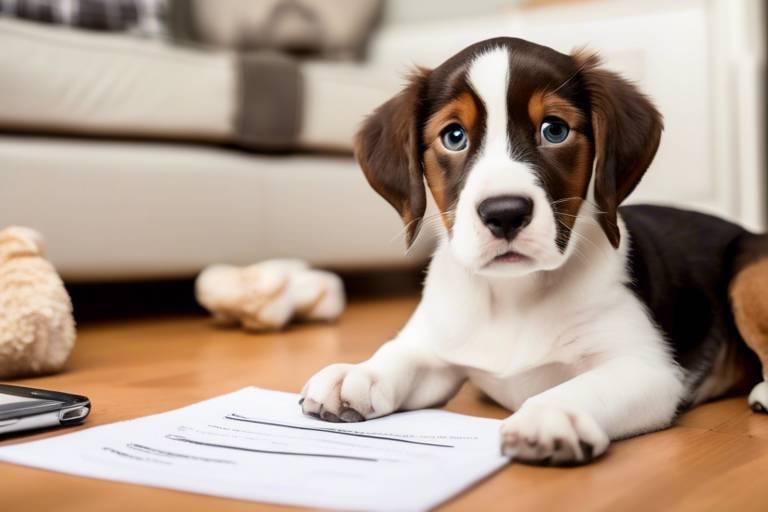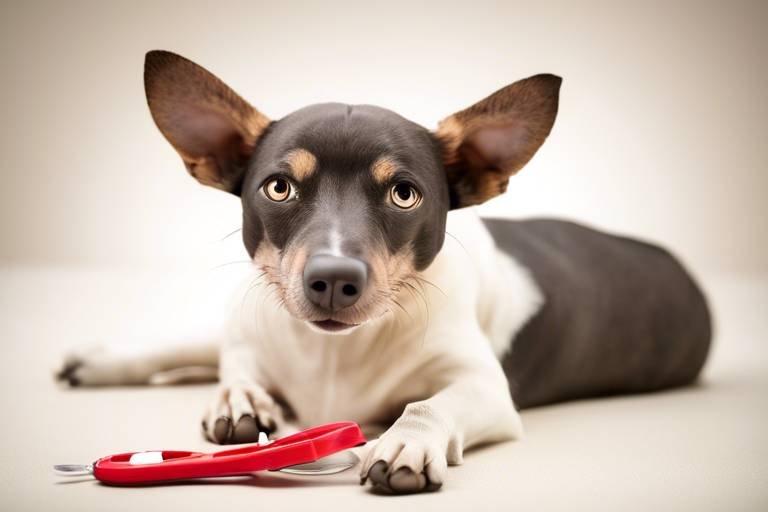The Best Ways to Calm an Anxious Pet in Emergencies
When it comes to our furry companions, emergencies can be incredibly stressful—not just for us but for them as well. Imagine being in a crowded room with loud noises, unfamiliar faces, and a sense of impending chaos. That's how your pet might feel during a thunderstorm, fireworks, or even a sudden change in their environment. It's essential to equip ourselves with effective strategies to help soothe our anxious pets during these high-stress situations. In this article, we’ll explore various methods to create a calming environment, utilize comfort items, and even delve into natural remedies that can assist in keeping our pets relaxed and secure.
Recognizing the signs and causes of anxiety in pets is crucial for any pet owner. Pets, much like humans, can experience a range of emotions, and anxiety is one of the more common ones. Some typical triggers include loud noises, changes in routine, or even the presence of strangers. Signs that your pet may be feeling anxious can manifest in various ways, such as excessive barking, hiding, pacing, or even destructive behavior. By understanding these triggers, pet owners can be more proactive in identifying when their furry friends need extra support. For instance, if your dog starts to tremble during a thunderstorm, it might be time to implement some calming techniques.
Establishing a secure environment can significantly reduce a pet's anxiety. Think of this space as a sanctuary where your pet can retreat to feel safe and comfortable. This area should be away from the chaos, perhaps a cozy corner of your home or a designated room. Incorporating familiar items that provide comfort during emergencies is vital. These can include your pet's favorite bed, toys, or even a piece of your clothing. Surrounding them with these familiar scents can help create a sense of security. Remember, the goal is to make this space feel like a safe haven, where your pet can relax and unwind.
Familiar toys, blankets, and bedding can play a significant role in soothing anxious pets. These comfort items serve as tangible reminders of safety and familiarity. For example, a soft blanket that your pet has snuggled with for years can provide warmth and security during distressing times. It's like a security blanket for a child; it offers a sense of comfort in the face of fear. Additionally, favorite toys can distract and comfort pets during emergencies, providing them with something to focus on other than their anxiety.
A soft, familiar blanket can be a game changer for your pet's comfort. When selecting the best blanket for your furry friend, consider their preferences—some pets may prefer a heavier, thicker blanket, while others might lean towards something lightweight and airy. The key is to choose a blanket that feels cozy and inviting. If you're unsure, try observing your pet's behavior with different materials to see which one they gravitate towards the most.
Favorite toys can serve as excellent distractions for pets during emergencies. When selecting toys, choose ones that your pet has a strong attachment to—these might be plush toys, chew toys, or even interactive puzzles. The idea is to engage your pet's mind and keep them occupied, which can help alleviate their anxiety. When they focus on play, they may forget about the stressful situation around them, even if just for a little while.
Different techniques can effectively calm an anxious pet. For instance, deep breathing exercises can help both you and your pet relax. You can also try gentle petting, which can provide reassurance and comfort. It's essential to maintain a calm demeanor yourself, as pets are incredibly sensitive to human emotions. Additionally, soothing sounds, such as calming music or white noise, can create a peaceful atmosphere that lulls your pet into a more relaxed state.
Exploring natural remedies can be beneficial for anxious pets. Many pet owners have found success with herbal supplements and essential oils, which can promote relaxation. However, it's crucial to research and consult with a veterinarian before introducing any new treatments to ensure they are safe for your pet. Some popular options include valerian root, chamomile, and lavender, which are known for their calming properties.
Certain herbal supplements can promote relaxation in pets. Popular options include valerian root and chamomile, both of which have been used for centuries to soothe anxiety. When incorporating these into your pet's routine, start with small doses and monitor their reaction. Always consult your veterinarian to determine the best approach and dosage for your pet's specific needs.
Essential oils can create a calming atmosphere for pets. Oils like lavender and chamomile are known for their soothing properties. However, it's essential to ensure that any oils you use are safe for pets, as some can be harmful. When using essential oils, consider diffusing them in the room or adding a few drops to your pet's bedding. Always introduce scents gradually and observe how your pet reacts to avoid overwhelming them.
Sometimes, professional intervention is necessary. If your pet's anxiety is severe, consulting with veterinarians or animal behaviorists can provide tailored strategies to manage their stress. These professionals can offer valuable insights and recommendations based on your pet's specific situation and needs.
Behavioral training can significantly improve an anxious pet's response to stress. Techniques such as desensitization and counter-conditioning can help pets learn to cope with their fears. Working with a professional trainer can provide you with the tools needed to implement these strategies effectively.
In some cases, medication may be required to manage anxiety. Various pharmaceutical options are available for pets, and it's crucial to seek guidance from a veterinarian to ensure the best course of action for your furry friend. Remember, medication should be a part of a comprehensive plan that includes behavioral training and environmental changes.
- What are the signs of anxiety in pets? Pets may show signs of anxiety through excessive barking, hiding, pacing, or destructive behavior.
- Can I use human calming products for my pet? It's best to consult with a veterinarian before using any human products on pets, as some may be harmful.
- How can I create a safe space for my pet? Establish a quiet area with familiar items like blankets and toys to help your pet feel secure.
- Are there natural remedies for pet anxiety? Yes, herbal supplements and essential oils can be effective but should be used with veterinary guidance.

Understanding Pet Anxiety
Understanding pet anxiety is the first step in ensuring our furry friends feel safe and secure, especially during stressful situations. Just like humans, pets can experience anxiety, and it’s essential to recognize the signs. When a pet is anxious, you might notice behaviors such as excessive barking, hiding, trembling, or even destructive actions like chewing furniture. These signs are their way of communicating that something is wrong, and as responsible pet owners, it’s our job to decode these messages.
There are various triggers that can lead to anxiety in pets. Some common causes include:
- Environmental Changes: Moving to a new home or introducing new family members can unsettle pets.
- Loud Noises: Thunderstorms, fireworks, or even vacuum cleaners can cause panic.
- Separation Anxiety: Pets can become distressed when left alone, leading to destructive behavior.
- Health Issues: Pain or illness can manifest as anxiety, making it crucial to rule out medical problems.
Recognizing these triggers is vital. For instance, if your dog starts to tremble during a thunderstorm, it’s a clear signal that they are feeling anxious. By observing their behavior, you can better understand what causes them distress and take proactive measures to help alleviate their anxiety. It’s also important to remember that each pet is unique; what triggers anxiety in one may not affect another. Thus, being attentive and responsive to your pet's individual needs is key.
Additionally, understanding the underlying reasons for your pet's anxiety can help you develop effective strategies to manage it. For example, if you find that your pet is anxious due to separation, you might consider implementing gradual desensitization techniques, which involve leaving your pet alone for short periods and gradually increasing the time as they become more comfortable. This method can help them learn that being alone is not a bad thing and that you will always return.
In conclusion, understanding pet anxiety is not just about recognizing the signs; it’s about being proactive in addressing the root causes. By creating a supportive environment and being mindful of your pet's needs, you can significantly reduce their anxiety and improve their overall quality of life.

Creating a Safe Space
When it comes to soothing an anxious pet, is one of the most effective strategies you can employ. Imagine your pet's favorite spot in the house, a cozy nook where they feel secure and at ease. This area can become a sanctuary during stressful times, providing them with the comfort they desperately need. To set up this calming environment, consider choosing a quiet room away from the chaos of daily life. Think of it as their personal retreat, where they can escape the noise and distractions.
In this safe space, incorporating familiar items is essential. Just like you might snuggle up with a favorite blanket or a beloved book during a storm, your pet will find solace in their own cherished belongings. Items such as their favorite toys, a soft bed, or even a piece of your clothing can create a sense of security. The smell of these items can be incredibly comforting, reminding them of happy moments and reducing their anxiety levels.
Here are some key elements to consider when creating a safe space for your pet:
- Location: Choose a quiet area in your home, away from loud noises and commotion.
- Comfort Items: Include their favorite blankets, toys, and even a piece of your clothing to provide familiarity.
- Safe Enclosure: If possible, use a crate or a small room where they can feel enclosed and secure.
- Soothing Environment: Dim the lights and reduce noise to create a peaceful atmosphere.
It’s also important to make this safe space inviting. You could add a comfortable bed or a soft mat for them to lay on. If your pet enjoys the warmth, consider placing a heating pad on low setting, but make sure to monitor it to prevent overheating. This cozy setup can be likened to wrapping yourself in a warm blanket on a cold day—it's all about comfort and security.
Additionally, consider using calming scents to enhance the ambiance of their safe space. Aromatherapy can work wonders for both humans and animals alike. Lavender and chamomile are popular choices that can help soothe nerves. Just remember to use pet-safe essential oils and consult with your veterinarian before introducing any new scents into your pet's environment.
Ultimately, the goal is to create a haven where your pet can retreat during times of stress. By establishing a safe space that caters to their needs and preferences, you can help them navigate through emergencies with a little more ease and comfort. Just like we all need a safe haven to retreat to when life gets overwhelming, our furry friends deserve the same.
Q1: How can I tell if my pet is anxious?
A: Look for signs like excessive barking, hiding, trembling, or destructive behavior. Each pet may show anxiety differently.
Q2: Can I create a safe space in a small apartment?
A: Absolutely! Even a small corner with their favorite items can serve as a safe retreat.
Q3: How long should I keep the safe space available?
A: It's best to have it accessible at all times, especially during known stressful events like thunderstorms or fireworks.
Q4: Are there any specific items I should avoid in the safe space?
A: Avoid items that may be too stimulating or distracting, such as squeaky toys or anything that might cause more stress.
Utilizing Comfort Items
When it comes to calming an anxious pet, utilizing comfort items can be a game changer. Just like how we might clutch a favorite blanket or hold onto a cherished toy during stressful times, our furry friends also find solace in familiar objects. These items serve as a tangible reminder of safety and love, which is crucial during emergencies or stressful situations. Imagine your pet, trembling under the sound of thunder or the chaos of a sudden storm, finding comfort in their favorite stuffed animal. It’s a small but significant way to help them feel more secure.
Comfort items can include a variety of things, but the most effective ones are often those that your pet has grown attached to over time. This could be a soft blanket, a beloved toy, or even a piece of your clothing that carries your scent. The key is to ensure that these items are readily available when your pet needs them the most. For instance, you might want to create a designated comfort zone in your home where these items are kept. This space should be quiet and away from the chaos, allowing your pet to retreat whenever they feel overwhelmed.
Here are some popular comfort items that can help soothe your anxious pet:
- Familiar Blankets: A soft, familiar blanket can provide warmth and security, much like a hug from a loved one.
- Favorite Toys: Toys that your pet loves can distract them from their anxiety and offer a sense of companionship.
- Your Clothing: An old t-shirt or a piece of clothing that smells like you can help reassure your pet that they are safe.
It’s important to note that not all comfort items will work for every pet. Some animals may prefer the texture of a particular blanket, while others might find joy in a squeaky toy. Observing your pet’s behavior and preferences will guide you in selecting the right items. Additionally, rotating these comfort items can keep things fresh and engaging for your pet, ensuring they remain interested and comforted.
Incorporating comfort items into your pet’s routine can also be beneficial outside of emergencies. For example, if your pet tends to get anxious during car rides or visits to the vet, having their favorite toy or blanket can help ease their stress. It’s all about creating a sense of familiarity and security, no matter the situation.
Ultimately, the goal is to create an environment where your pet feels safe and loved. By utilizing comfort items effectively, you can help alleviate their anxiety and make stressful situations a little less daunting. Remember, a calm pet leads to a calmer owner, and that’s a win-win for everyone involved!
Choosing the Right Blanket
When it comes to soothing your anxious pet, the right blanket can be a game changer. Just think about it: when you're feeling stressed or overwhelmed, what do you often reach for? A cozy blanket, right? Our furry friends are no different! A soft, familiar blanket can provide a sense of warmth and security that helps ease their anxiety during emergencies. But how do you choose the perfect one for your pet? Here are some important factors to consider:
- Material: Look for blankets made from soft, breathable fabrics. Fleece and microfiber are excellent choices as they provide warmth without overheating your pet.
- Size: Ensure the blanket is large enough for your pet to curl up comfortably. A blanket that’s too small won’t provide the security they need, while one that’s too large may feel overwhelming.
- Familiarity: If your pet already has a favorite blanket, use that! The scent and feel of something familiar can be incredibly comforting during stressful times.
- Washability: Pets can be messy, especially during anxious moments. Choose a blanket that is machine washable for easy cleaning and maintenance.
Additionally, consider your pet's specific needs. For instance, older pets may benefit from thicker, warmer blankets to help with joint pain, while younger pets might prefer lighter options for snuggling. Remember, the goal is to create a comforting environment where your pet feels safe and secure. By choosing the right blanket, you're not just providing warmth; you're offering a sanctuary that can help them weather the storm of anxiety.
In conclusion, investing time in selecting the right blanket for your pet can make a world of difference. It’s not just a piece of fabric; it’s a tool that can help alleviate their stress and provide them with the comfort they crave during emergencies. So go ahead, find that perfect blanket, and watch your pet relax and feel at ease!
Here are some common questions pet owners have regarding calming their anxious pets:
- What signs indicate my pet is anxious? Look for signs like excessive barking, hiding, pacing, or destructive behavior. These can indicate your pet is feeling stressed.
- Can I use human blankets for my pet? Yes, but ensure they are safe and free from any harmful materials. It's often better to use blankets specifically designed for pets.
- How often should I wash my pet's blanket? It’s a good idea to wash it regularly, especially if your pet has accidents or sheds a lot. A clean blanket helps maintain a calming environment.
Incorporating Favorite Toys
When it comes to calming an anxious pet, incorporating their favorite toys can be a game changer. Just like how a child's beloved teddy bear provides comfort during scary moments, a pet's favorite toy can serve as a source of reassurance and distraction. Imagine your pet, wide-eyed and trembling during a thunderstorm, suddenly finding solace in their squeaky toy. It's a small yet powerful tool that can help transform their anxiety into playfulness.
Choosing the right toys is essential. You want to consider what your pet loves most. Is it a plush toy, a rubber ball, or perhaps a tug rope? Each pet has unique preferences, and understanding these can help you make informed choices. For instance, dogs may prefer toys they can chew on, while cats might enjoy something they can bat around. Here are some tips to keep in mind:
- Familiarity is Key: Always opt for toys that your pet is already comfortable with. A familiar scent and texture can make a world of difference in alleviating their anxiety.
- Interactive Toys: Consider toys that engage your pet in play. Puzzle toys can distract them and keep their minds off the stressful situation, providing both entertainment and mental stimulation.
- Soft and Cuddly: For pets that seek comfort, plush toys can be incredibly soothing. They can snuggle up with these toys, which can help reduce feelings of anxiety.
Additionally, the act of playing can release endorphins, which are natural stress relievers. Engaging your pet in playtime with their favorite toys not only distracts them from their anxiety but also strengthens your bond. It’s like throwing a lifeline in a stormy sea; it helps them feel anchored and secure.
Remember to rotate their toys to keep things fresh and exciting. Sometimes, a toy that was once their favorite might lose its charm. By introducing new options regularly, you can maintain their interest and provide ongoing comfort. This simple act of incorporating their favorite toys can make a significant difference in how they cope with anxiety during emergencies.
Calming Techniques
When your pet is feeling anxious, it can be heart-wrenching to watch them struggle with their fears. Fortunately, there are several that you can employ to help soothe your furry friend during stressful situations. One of the most effective methods is to practice deep breathing exercises. Just like humans, pets can benefit from a little relaxation. You can start by taking a few deep breaths yourself, then gently guide your pet to mimic your actions. This can create a calming atmosphere and signal to your pet that it’s okay to relax.
Another technique that works wonders is gentle petting. The simple act of stroking your pet can release endorphins, which are natural stress relievers. Try to focus on areas where your pet enjoys being touched, such as their back or behind the ears, and maintain a slow, rhythmic motion. This can help them feel more secure and loved, reducing their anxiety levels significantly.
Additionally, consider using soothing sounds to create a calm environment. Soft music or nature sounds can have a profound effect on your pet’s mood. There are even playlists specifically designed for pets that can help ease their anxiety. If you notice your pet responding positively to certain sounds, make it a part of your calming routine. You might be surprised at how effective this can be in helping your pet find their zen during emergencies.
It's also beneficial to keep your pet's favorite items nearby. Familiar scents can be incredibly comforting. For instance, if you have a favorite blanket or a piece of your clothing, let your pet snuggle with it. The familiarity of these items can create a sense of safety, making them feel less alone in their distress.
Remember, every pet is unique, and what works for one might not work for another. It’s essential to observe your pet’s reactions and adjust your techniques accordingly. Sometimes, combining several methods can yield the best results. For instance, you might find that gentle petting while playing soothing music creates the perfect calming atmosphere for your anxious pet.
- What are the signs of anxiety in pets? Common signs include excessive barking, hiding, destructive behavior, and excessive grooming.
- How long should I practice calming techniques? It's best to start with short sessions, gradually increasing the duration as your pet becomes more comfortable.
- Are there any medications for pet anxiety? Yes, there are various medications available, but always consult your veterinarian before administering any.

Natural Remedies for Anxiety
When it comes to soothing an anxious pet, many pet owners are turning to natural remedies as a gentle alternative to traditional medications. These remedies can be incredibly effective, providing a holistic approach to managing anxiety without the side effects often associated with pharmaceuticals. It's essential to remember that each pet is unique, so what works for one may not work for another. However, understanding the various options available can help you find the best fit for your furry friend.
One popular category of natural remedies includes herbal supplements. These plant-based solutions have been used for centuries to promote relaxation and calmness. Some of the most common herbal supplements for pets include:
- Chamomile: Known for its calming properties, chamomile can help reduce anxiety and promote sleep.
- Valerian Root: Often used as a sedative, valerian root can help alleviate stress and anxiety in pets.
- Passionflower: This herb is known to help with restlessness and anxiety, making it a great option for nervous pets.
It's crucial to consult with a veterinarian before introducing any herbal supplements to your pet's routine. They can provide guidance on proper dosages and ensure that the supplements won't interact negatively with any existing medications your pet may be taking.
Another effective natural remedy for anxiety in pets is the use of essential oils. These concentrated plant extracts can create a calming atmosphere and help alleviate stress. However, not all essential oils are safe for pets, so it's vital to choose wisely. Some of the most pet-friendly essential oils include:
- Lavender: Renowned for its soothing properties, lavender oil can help calm anxious pets and promote relaxation.
- Frankincense: This oil can help reduce stress and promote a sense of peace in your pet.
- Chamomile: Just like the herbal supplement, chamomile essential oil can also help soothe anxious feelings.
When using essential oils, it's important to dilute them properly and avoid applying them directly onto your pet's skin. Instead, consider using a diffuser to disperse the scent in the room or adding a few drops to a cotton ball placed in their safe space. Always monitor your pet for any adverse reactions when introducing new scents.
In addition to herbal supplements and essential oils, creating a calming environment can significantly help reduce anxiety. This can be achieved by incorporating familiar items such as blankets, toys, and even your scent into their safe space. The goal is to create an oasis of comfort where your pet feels secure and relaxed. You might even consider playing soft music or using a white noise machine to drown out any stressful sounds from the outside world.
Ultimately, the key to finding the best natural remedy for your pet's anxiety lies in experimentation and observation. Pay attention to how your pet responds to different remedies and adjust accordingly. With a little patience and care, you can help your furry friend navigate through those anxious moments with greater ease.
Q: Are natural remedies safe for all pets?
A: While many natural remedies can be safe, it's essential to consult with your veterinarian to ensure they are appropriate for your specific pet, especially if they have existing health issues or are on medication.
Q: How long does it usually take for natural remedies to work?
A: The time it takes for natural remedies to show effects can vary. Some may provide immediate relief, while others might take a few days to build up in your pet's system. Consistency is key!
Q: Can I combine different natural remedies?
A: Yes, but you should always consult with a veterinarian before combining remedies to ensure there are no adverse interactions.
Herbal Supplements
When it comes to calming an anxious pet, herbal supplements can be a game changer. Many pet owners are turning to natural remedies to help soothe their furry friends, and for good reason! These supplements can provide a gentle, non-invasive way to alleviate stress and anxiety. Some popular options include Chamomile, known for its relaxing properties, and Valerian Root, which has been used for centuries to promote calmness.
It's essential to understand how these herbal supplements work and how to safely incorporate them into your pet's routine. For instance, Chamomile can be administered in tea form or as a tincture, while Valerian Root is often found in capsule or powder form. However, before introducing any new supplement, a quick chat with your veterinarian is a must. They can help you determine the right dosage and ensure that the supplement won't interact negatively with any other medications your pet may be taking.
Here’s a quick overview of some popular herbal supplements for pets:
| Herbal Supplement | Benefits | Administration Method |
|---|---|---|
| Chamomile | Reduces anxiety and promotes relaxation | Tincture or tea |
| Valerian Root | Helps with sleep and reduces nervousness | Capsule or powder |
| Lavender | Calming scent; can reduce stress | Essential oil (diffused) |
| Passionflower | Promotes calmness and reduces agitation | Tincture or capsule |
While herbal supplements can be beneficial, it’s crucial to monitor your pet’s reaction. Each animal is unique, so what works wonders for one might not have the same effect on another. Always start with a small dose and observe how your pet responds. If you notice any adverse reactions, discontinue use immediately and consult your vet.
Incorporating herbal supplements into your pet's routine can be a valuable tool in your anxiety management toolkit. Not only do they offer a natural alternative, but they can also enhance your pet's overall well-being. Remember, the goal is to create a peaceful environment where your pet feels safe and secure.
- Are herbal supplements safe for all pets? - While many herbal supplements are safe, it’s essential to consult your veterinarian, especially if your pet has existing health issues or is on medication.
- How long does it take for herbal supplements to work? - The effects can vary depending on the supplement and the pet. Some may notice improvements within a few days, while others might take longer.
- Can I combine different herbal supplements? - It’s best to consult your veterinarian before combining supplements, as interactions can occur.
Essential Oils for Calming
Essential oils have gained popularity as a natural way to create a calming atmosphere for pets, especially during stressful situations. These concentrated plant extracts can help soothe anxious pets, making them feel more secure in their surroundings. However, it’s crucial to understand that not all essential oils are safe for animals. Some can be toxic, so it’s essential to do your research before using them around your furry friends.
When considering essential oils for calming, you might want to look into the following options that are generally regarded as safe for pets:
- Lavender: Known for its relaxing properties, lavender can help reduce anxiety and promote a sense of calm.
- Chamomile: This oil is excellent for soothing nerves and can be particularly helpful during thunderstorms or fireworks.
- Frankincense: Often used for its grounding effects, frankincense can help pets feel more centered and relaxed.
To use essential oils effectively, consider the following methods:
- Diffusion: Using a diffuser in the room where your pet spends time can disperse calming scents into the air. Make sure the area is well-ventilated, and allow your pet to leave the space if they feel uncomfortable.
- Topical Application: Some oils can be diluted with a carrier oil and applied to your pet's collar or bedding. Always consult your vet for guidance on safe dilution ratios and application methods.
While essential oils can be beneficial, it’s essential to monitor your pet’s reaction. If they show signs of discomfort or adverse reactions, it’s best to discontinue use immediately. Additionally, always consult with a veterinarian before introducing any new products into your pet’s environment, especially if they have existing health conditions or are pregnant.
In summary, essential oils can be a valuable tool in your arsenal for calming anxious pets. By selecting safe oils, using them appropriately, and observing your pet's reactions, you can create a soothing environment that helps them feel more secure during stressful times.
Q: Are all essential oils safe for pets?
A: No, not all essential oils are safe for pets. Oils like tea tree, eucalyptus, and citrus oils can be toxic. Always research and consult your veterinarian before using any essential oil.
Q: How can I tell if my pet is reacting negatively to an essential oil?
A: Signs of a negative reaction can include excessive drooling, vomiting, lethargy, or difficulty breathing. If you notice any of these symptoms, remove your pet from the area and seek veterinary assistance.
Q: Can I use essential oils on my cat?
A: Cats are generally more sensitive to essential oils than dogs. It’s crucial to consult with a veterinarian before using any essential oils around cats.
Q: How often can I use essential oils for my pet?
A: The frequency of use depends on the specific oil and your pet’s individual needs. Always follow guidelines provided by your veterinarian and observe your pet's reactions.

Seeking Professional Help
When it comes to addressing your pet's anxiety, sometimes the best course of action is to seek professional help. Just like humans, pets can experience anxiety that may require more than just home remedies or calming techniques. If you've noticed that your furry friend struggles significantly during stressful situations, it might be time to consult with a veterinarian or an animal behaviorist. These professionals can provide tailored strategies that suit your pet's unique needs.
A veterinarian can help rule out any underlying medical issues that might be contributing to your pet's anxiety. For instance, conditions such as thyroid problems or chronic pain can exacerbate anxiety symptoms. By conducting a thorough examination and possibly running some tests, your vet can ensure that your pet is physically healthy and ready for behavioral intervention.
On the other hand, an animal behaviorist specializes in understanding pet behavior and can offer insights that are not only practical but also effective. They can assess your pet's specific triggers and develop a customized behavior modification plan. This might include techniques such as desensitization or counter-conditioning, which can gradually help your pet become more comfortable in previously anxiety-inducing situations.
It’s important to remember that behavioral training is a process that requires patience and consistency. Here are a few techniques that professionals might suggest:
- Positive Reinforcement: Rewarding your pet for calm behavior can help reinforce good habits.
- Gradual Exposure: Slowly introducing your pet to stressors in a controlled manner can help them adjust.
- Routine Establishment: Keeping a consistent schedule can provide a sense of security for anxious pets.
In some cases, medication may be necessary to help manage anxiety. This is where your vet's expertise is crucial. They can prescribe anti-anxiety medications that are safe for your pet and monitor their effects. It's essential to follow their guidance closely, as the right dosage and type of medication can differ significantly between pets.
In conclusion, don't hesitate to seek professional help if your pet's anxiety seems overwhelming. With the right support and a tailored approach, you can help your furry friend feel more secure and comfortable in their environment. Remember, you are not alone in this journey—many pet owners face similar challenges, and there are resources available to help you navigate through them.
Here are some common questions pet owners have regarding seeking professional help for anxious pets:
- How do I know if my pet needs professional help?
If your pet shows persistent signs of anxiety, such as excessive barking, hiding, or destructive behavior, it’s a good idea to consult a professional. - What should I expect during a vet visit?
The vet will likely perform a physical examination, discuss your pet's behavior, and may suggest tests to rule out medical issues. - Can behavior modification be done at home?
Yes, many techniques can be practiced at home, but guidance from a professional can enhance effectiveness.
Behavioral Training
Behavioral training is a powerful tool that can significantly enhance the way your anxious pet responds to stressful situations. Think of it as equipping your furry friend with a toolkit of coping mechanisms that they can rely on during emergencies. Just like we learn to manage our stress through various techniques, pets can also be trained to handle their anxiety more effectively. The goal here is to create a structured approach that helps your pet feel more secure and confident, especially when unexpected events occur.
One effective method is to use positive reinforcement. This involves rewarding your pet for calm behavior during stressful situations. For instance, if a loud noise triggers anxiety, you can start by exposing your pet to that noise at a low volume while providing treats and praise for staying calm. Over time, gradually increase the volume, ensuring that your pet remains relaxed. This technique not only helps them associate the noise with positive experiences but also builds their resilience.
Incorporating basic commands such as "sit," "stay," or "leave it" can also be beneficial. These commands can serve as distractions during high-stress moments. For example, if your pet starts to panic during a thunderstorm, asking them to "sit" can redirect their focus, allowing them to calm down. Consistency is key here; practice these commands regularly, so your pet becomes familiar with them and can respond even under pressure.
Another method worth considering is desensitization. This involves gradually exposing your pet to the anxiety-inducing stimulus in a controlled manner. For example, if your pet is anxious about car rides, start by letting them sit in the car without going anywhere. Reward them with treats and praise during this time. Once they are comfortable, you can begin taking short trips, slowly increasing the duration as they become more at ease. This gradual approach can help reduce their fear and anxiety significantly.
It's also essential to create a positive environment during training sessions. Ensure that your pet feels safe and comfortable. You might want to use calming music or soothing scents, such as lavender, to enhance the atmosphere. By making training sessions enjoyable, you foster a stronger bond with your pet, which can further alleviate their anxiety.
Lastly, remember that patience is paramount. Every pet is unique, and what works for one may not work for another. Be prepared for setbacks and celebrate small victories along the way. The journey of behavioral training can be a rewarding experience, not just for your pet but for you as well. As your pet learns to navigate their anxiety with your guidance, you'll find that your bond grows stronger, creating a more harmonious living environment for both of you.
- How long does it take to see results from behavioral training? Results can vary widely depending on the pet and the techniques used. Some may show improvement within a few sessions, while others may take weeks or even months.
- Can I train my pet myself, or should I seek a professional? While many pet owners successfully train their pets, consulting a professional trainer or animal behaviorist can provide tailored strategies, especially for severe anxiety cases.
- Are there specific breeds more prone to anxiety? Yes, certain breeds may be more susceptible to anxiety due to their temperament or history. However, any pet can develop anxiety regardless of breed.
- What should I do if my pet shows signs of severe anxiety? If your pet's anxiety is overwhelming, consult your veterinarian or a qualified animal behaviorist for advice on the best course of action.
Medication Options
When it comes to managing anxiety in pets, sometimes the best approach involves medication. Just like humans, pets can experience anxiety that may require more than just comforting techniques or environmental adjustments. It's essential to understand that medication should always be considered as part of a comprehensive treatment plan, ideally under the guidance of a veterinarian. They can assess your pet's specific needs and recommend appropriate options.
There are various types of medications available for anxious pets, and each serves a different purpose. Some are designed for short-term use during particularly stressful situations, such as thunderstorms or fireworks, while others may be prescribed for long-term management of chronic anxiety. Here’s a quick overview of common medication types:
| Medication Type | Common Uses | Considerations |
|---|---|---|
| SSRIs (Selective Serotonin Reuptake Inhibitors) | Long-term treatment for chronic anxiety | May take several weeks to see effects; potential side effects |
| Benzodiazepines | Short-term relief during acute stress | Can be habit-forming; should be used cautiously |
| Tricyclic Antidepressants | Long-term anxiety management | May have side effects; needs veterinarian monitoring |
| Natural Supplements | Supportive care for mild anxiety | Generally safe, but consult with a vet for dosage |
When considering medication, it’s crucial to have an open dialogue with your veterinarian. They will likely ask about your pet’s behavior, health history, and any previous treatments that have been tried. This information is vital for tailoring a treatment plan that fits your furry friend’s unique needs.
Additionally, it's important to monitor your pet closely once they start any new medication. Watch for any changes in behavior, appetite, or energy levels, and report these to your vet. Adjustments may be necessary to find the right balance for your pet's well-being. Remember, the goal is to help your pet feel more comfortable and secure, allowing them to thrive even in stressful situations.
In conclusion, while medication can be an effective tool in managing pet anxiety, it should always be used in conjunction with behavioral strategies and environmental modifications. By working closely with your veterinarian, you can ensure that your pet receives the best possible care and support.
- What are the signs that my pet is anxious? Look for behaviors like excessive barking, hiding, pacing, or destructive actions. Each pet may show anxiety differently.
- Can I use human medications for my pet? No, never give your pet human medications without consulting a veterinarian, as they can be harmful or even fatal.
- How long does it take for anxiety medication to work? It varies by medication; some may take effect within hours, while others might take weeks to show improvement.
- Are there side effects to pet anxiety medications? Yes, like any medication, there can be side effects. Always discuss potential risks with your veterinarian.
Frequently Asked Questions
- What are the common signs of anxiety in pets?
Pets can show anxiety in various ways, such as excessive barking, hiding, destructive behavior, or changes in eating habits. It's essential to observe your pet closely to identify these signs and provide the necessary support.
- How can I create a calming environment for my pet?
To create a calming environment, designate a safe space in your home with familiar items like blankets and toys. Ensure the area is quiet and free from disturbances, and consider using soft lighting to help your pet feel more secure.
- What types of comfort items can help soothe an anxious pet?
Comfort items such as soft blankets, favorite toys, and even your clothing can provide a sense of security for anxious pets. These familiar objects can help them feel more at ease during stressful situations.
- Are there natural remedies that can help with pet anxiety?
Yes, natural remedies like herbal supplements and essential oils can be beneficial for calming anxious pets. Always consult your veterinarian before introducing new remedies to ensure they are safe for your furry friend.
- When should I seek professional help for my pet's anxiety?
If your pet's anxiety is severe or persistent, it's crucial to consult a veterinarian or an animal behaviorist. They can provide tailored strategies and, if necessary, recommend medication to help manage your pet's anxiety effectively.
- Can behavioral training help my anxious pet?
Absolutely! Behavioral training can significantly improve how your pet responds to stress. Techniques such as desensitization and positive reinforcement can help your pet cope better in emergencies.
- What medication options are available for anxious pets?
There are various medications available to help manage pet anxiety, including anti-anxiety drugs and sedatives. It's essential to work closely with your veterinarian to find the right medication and dosage for your pet's specific needs.



















